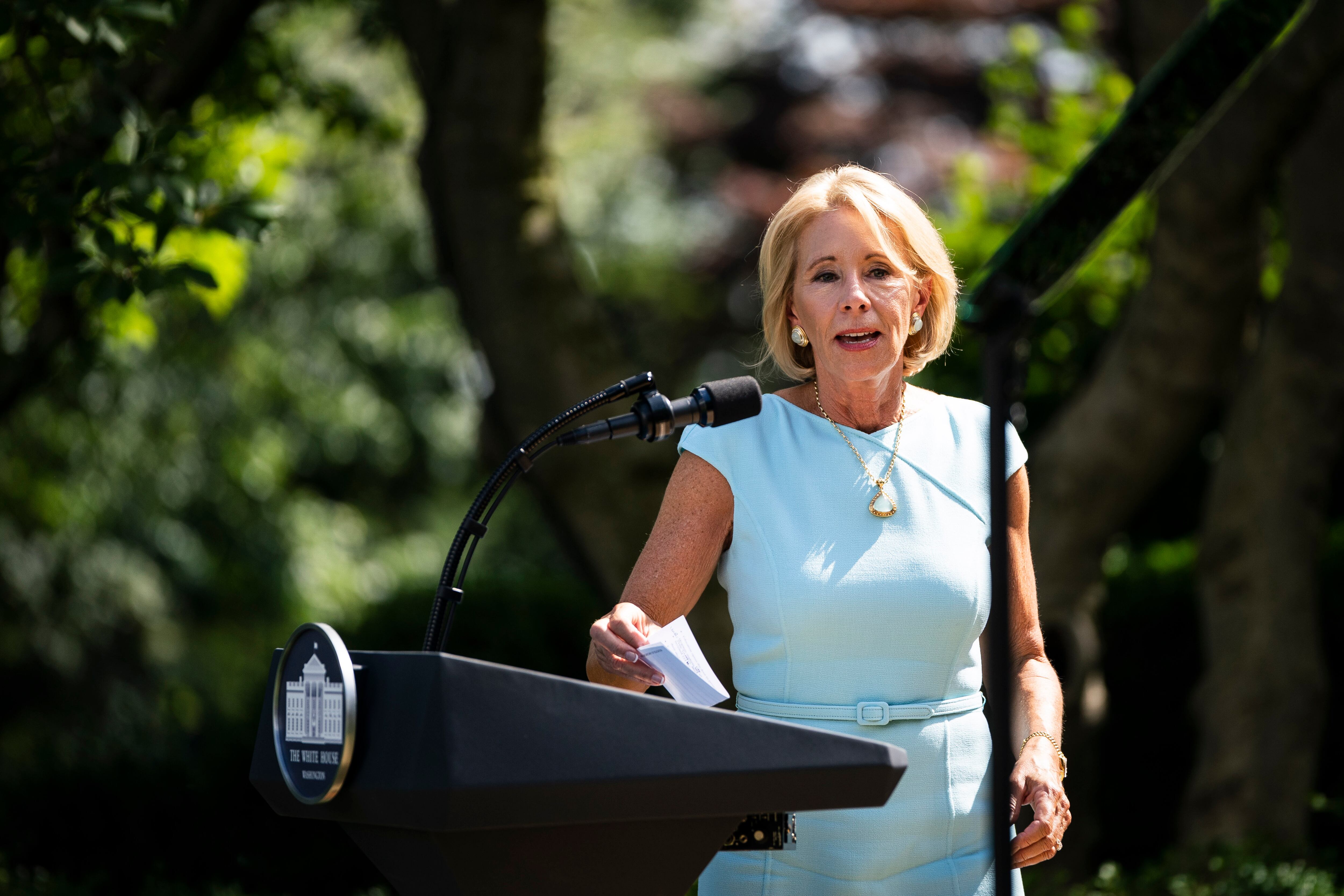Education Secretary Betsy DeVos has long argued that officials in Washington should have little involvement in local education decisions. Now, she’s pushing for schools across the country to reopen physically and threatening them financially if they don’t.
In 2018, she asked rhetorically: “Why do students have to go to a school building in the first place?” Now, she’s saying schools shouldn’t rely on online learning options as they work out how to reopen this fall, and students should be expected to return to physical school buildings where they learn best.
In two televised interviews this weekend, DeVos repeated the Trump administration’s message that schools must physically reopen, without clearly addressing concerns of worried school officials and parents. And her comments also made clear that, at least for now, she’s putting her past positions on local control and virtual education on the back burner.
“Going into the fall, education leaders need to ensure that kids are going to be able to be learning full-time, no matter how that looks,” DeVos said in a CNN interview Sunday. Pushed on the details, DeVos said local decisionmaking matters, too. “Schools should do what’s right on the ground at that time for their schools and for their situation,” she said.
CNN’s Dana Bash highlighted the key contradiction. “You are arguing over and over that they should handle this on a local level, but at the same time you are trying to push them to do a one-size-fits-all approach, which is go back and reopen schools,” she said. “You can’t have it both ways.”
DeVos previously emphasized getting Washington out of schools’ way; now she and other federal officials are demanding schools reopen
In one sense, DeVos’ push for widespread school reopenings is not surprising — she has simply followed the lead of her boss, President Trump, who has taken to Twitter to demand that schools open this fall as part of his bid to revitalize the economy.
But in another sense, the comments mark a shift for DeVos, who has criticized past education secretaries for being too willing to meddle in local schools. “Under both Republican and Democratic administrations, Washington overextended itself time and time again,” she said in a speech two years ago. “Educators don’t need engineering from Washington. Parents don’t need prescriptions from Washington.”
Now she’s threatening to withhold education dollars from schools that don’t physically reopen. (DeVos and Trump don’t have control of federal funding for schools in such a granular way. The administration has indicated it will try to attach reopening requirements to education dollars in the expected stimulus package.)
Even some usual allies have balked at this idea. “In one sweeping action, the President and Secretary would try to assume control of every single public school in the country. Rather than recognizing, as Secretary DeVos has time and time again, the incredible diversity of schools in America and the varying impact that the coronavirus has on communities, all schools in America would be treated the same,” wrote Mike McShane, of the group EdChoice, which, like DeVos, promotes private school tuition vouchers. (EdChoice is a funder of Chalkbeat.)
Over the weekend, DeVos briefly acknowledged that the local spread of the virus might require schools to close for a “few days.”
But nationally cases are increasing, markedly in some states. DeVos has also downplayed or ignored other national public health guidance, including from the CDC, the most recent statement from the American Academy of Pediatrics, and a risk analysis funded by her own U.S. Department of Education.
DeVos’ position has also been confusing: Administration officials have repeatedly raised the threat of withholding federal dollars from schools that don’t reopen, but when pressed, said they believe in local control.
“Schools that are willing to provide a full school year of learning and be fully operational have no risk of losing funding,” department spokesperson Liz Hill said in a statement Friday. “But should a school choose to neglect its responsibility to educate students, they should not receive taxpayer money for a job that’s not being done.”
But Hill did not explain what “fully operational” meant, particularly whether it referred to daily in-person instruction for all students. This weekend, DeVos suggested it does. “For families that need their kids in-school in person five days a week, that has to be an option.”
DeVos once asked “Why do students have to go to a school building in the first place?” Now she wants every school building open.
Another shift: DeVos’s view on virtual education. DeVos has long been enthusiastic about the option of virtual instruction, saying it’s an example of how schools should rethink their basic structures and approaches to best serve students.
Just months ago, DeVos used $180 million from Congress to incentivize states to create or expand virtual schools or to create “models for providing remote education not yet imagined.” Her intent was clear. “If our ability to educate is limited to what takes place in any given physical building, we are never going to meet the unique needs of every student,” DeVos said in April, announcing the competition. The money was earmarked by Congress for states hit hardest by the pandemic and said nothing about virtual instruction.
But as Trump pushes for school buildings to reopen, he’s targeted his ire at virtual instruction. “Now that we have witnessed it on a large scale basis, and firsthand, Virtual Learning has proven to be TERRIBLE compared to In School, or On Campus, Learning,” Trump tweeted.
DeVos, in supporting that push to reopen schools physically, has pointed to the downsides of fully online learning. “The go-to needs to be kids in school, in person, in the classroom, because we know for most kids, that’s the best environment for them,” she said Sunday.
There’s something to that, even though it’s a new position for DeVos. Research, including a newly released study on virtual charter schools in Georgia, has repeatedly found that fully virtual instruction is less effective than in-person learning.






